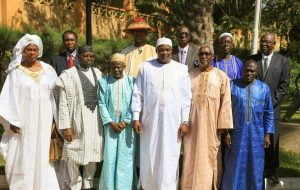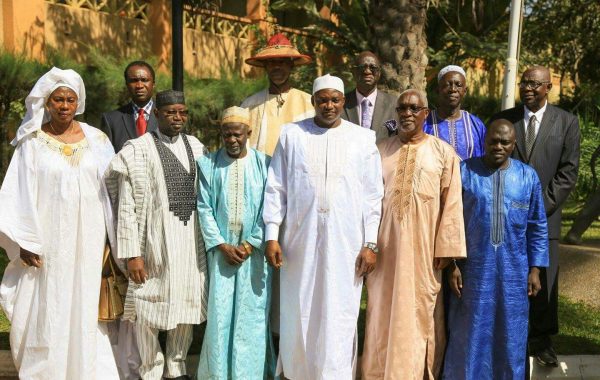
(JollofNews) – My Fellow Comrades,
Congratulations to the ten appointed ministers and let us all wish them well in granting their functional and administrative responsibilities.
Let us also hope that they would dispense these responsibilities with the true spirit of democracy and the constitutional mandates of the Republic of the Gambia.
A new government that takes over after a dictatorship has a higher mountain to climb. Some of us will continue to vet the Barrow Administration without fear because we don’t believe in giving any government a blanket check. When we criticized and fought against the Jammeh dictatorship, we were called the true gallants of democracy. So we also are obligated to use the same objective vetting against the new democratic government of the Gambia.
At this juncture, I have serious concerns and reservations about the size of the government that the Barrow Administration is envisioning. The 17 ministerial portfolios will be too cumbersome and wasteful, especially when the country’s coffers were totally emptied by Dictator Yahya Jammeh.
Realistically, the fisheries and forestry ministry should have merged with the ministry of agriculture. Since independence, at least 75% of the annual budget of the Gambia was financed through external loans and grants. Consequently, for over 50 years, the Gambia’s internal budgetary financing realized only about 25% of the entire appropriations and expenditures
In fact, annual budgetary deficits were financed through external loans, and most of these loans are still outstanding and unpaid for. Truthfully, the Barrow Administration should assemble a budgetary discipline approach; namely zero budgeting where the establishment of every ministry is objectively questionable and debatable.
 Thus, I hope the Barrow Administration would take a conservative approach for a smaller government than the apparent expanded system that is likely to result in recurring budget deficits during its mandate period of three years.
Thus, I hope the Barrow Administration would take a conservative approach for a smaller government than the apparent expanded system that is likely to result in recurring budget deficits during its mandate period of three years.
In assessing a government’s performance, it is imperative to analyze whether the government has the ability to consistently deliver what it had promised. With the exit of Dictator Jammeh and the fact that there are depleted revenues and grants, the Barrow Administration should take a more conservative approach in tackling both fiscal and social policies. Thus, as a primary means of yielding its promises to the citizenry, the Barrow Administration should consume a maximum of 12 ministries, and seriously shrink SIS and the military so that needed funds are conserved in order to avoid budgetary imbalances.
A foundation of realizing promises through budgetary processes is to evaluate how resources are estimated, realized, and earmarked for expenditures. In this gloomy situation for the Gambia, the Barrow Administration will have a higher mountain to climb if it does go ahead with the 17 proposed ministerial portfolios.
In terms of the budget period, I would like to propose for the new government to revert to the fiscal year instead of a calendar year that was used by the dictatorship. In all fairness, to any incoming administration, a calendar year approach is more likely to cripple allotment and accountability of revenues/grants/loans, and the configuration and dispensation of budgetary expenditures.
In another area, and until the constitution is amended, voted for by the Gambian people, and signed into law by President Barrow, I argue categorically that the 1997 constitution is the supreme law of the Gambia. Thus, if it is unconstitutional for Gambians with dual citizenships to be appointed ministers, then it is contrary to the same constitutional requirement to appoint a Vice President whose age violates the same constitutional interpretation.






Getting rid of Yahya was the easy part. Now that Yahya is gone fixing Gambia will be the hard part. I hope and pray that the new president and his newly appointed cabinet do not take the attitude of many leaders in Africa take and adopt the attitude of “now, what’s in it for me”. The same can be said of their families, friends or tribe. “What’s in it for them”? I hope that the New President and Ministers leave office with the same amount of wealth and assets as when they entered office and are working for the people of Gambia as the true servants of the people as they really are.
Just my two bututs worth of ranting.
Stan and Lamine, I believe that has been the case with the previous Gambian regime and may very well be the case in this new republic. Show me a modern day politician that’s not in the game for what’s in it for them and I’ll say, here’s a saint. Vested interest is the primary driver of most Gambians that are well past retirement age but jockeying for positions in competition with the younger generation and fighting to stay relevant. How about filling advisory roles in the true spirit of the Gambian adage that “Makk Baahh Na Chi Kerr” or “Alfaa Beteyaa Ta Suwo Kono Leh”. Certainly, everyone can use the good advice of a retired Secretary General and Head of The Civil Service or Secretary of The Cabinet!
I always said that getting rid of Yaya Jammeh was one part of the task. However, the second part and possibly the most important is changing the Gambian mindset that’s a combination of What’s In It For Me, FANG KOTO BAMBANGO, KU RACHA TEGG SA KANAM and that government is the cow that’s tethered out there for all and sundry to MILK for what it’s worth WITHOUT EVER FEEDING THE POOR COW!
Therein lies the real conundrum for the coalition government made up of major party aparatchicks, vested interest and party leaders without a following that we can speak of.
On another note Stan, on the NEED FOR SMALLER GOVERNMENT, a case of putting old wine in new wine bottles is where the Minister of Agriculture touts decades old projects such as the French government sponsored Cotton Project or the Jahally-Pacharr rice scheme as succes stories. HARDLY! The danger here is that the limited perspective of the Minister is causing him to lead us down the misguided path of programs and projects that promoted products that could neither be produced efficiently and profitably nor compete effectively in international markets. If only the Minister was committed to reading project evaluation documents during his previous tenure at the Ministry of Agriculture, he would recall that numerous reports detailed exactly why cotton production was not profitable for the farmers in the upper part of the country and that the Cotton Project was neither beneficial nor sustainable in The Gambia. Labeling a project a FOREIGN EXCHANGE EARNER alone is not enough. Let’s not forget that Ministers of state claiming to be executives in their roles must have the knowledge and perspective to back these claims.
Similarly, groundnut production didn’t help The Gambian farmer in that most farmers experienced extensive losses through poor cultural practices, post-harvest and storage losses.
In other words, not only was the harvest poor but that the final product was not of a standard that could compete for average prices set in the international markets. The traditional Lumos may want the crop at their price but that doesn’t bode well for the farmers that expend all those man hours to produce a measly crop of peanuts. The Minister representing the government of the day kept burying his head in the sand crying out to the European Union, FAO, Stabex and other bodies for help with expanding program upon program and project upon project while ignoring the fact that there was hardly enough seed bank stock or seed multiplication capacity in The Gambia to support a vibrant groundnut crop. A major part of the problem Stan, was that the Minister and by extension his cohorts had a vested interest in keeping the projects going. It was all about What’s In It For Us. Avenues for draining state funds is what projects are all about. Kick backs for purchasing vehicles from local suppliers, transfer pricing schemes with sham offshore suppliers, back end commissions and the appointment of Project Managers/Coordinators that serve at the pleasure of the Minister.
Agricultural projects as we know it in The Gambia or any project for that matter only add to BIG GOVERNMENT with little in it for the targeted beneficiaries. What was labeled The Small Scale Water Controlled Project in the CRR was a classic case of a failed project. I challenge the current Minister of Agriculture or any other Minister to show evidence of a single project evaluation that showed a rise in the living standards of beneficiary communities. Palpable gains are the object here.
Socioeconomic metrics that have been embellished to show positive gains in numbers of tons per hectare is not what we are looking at here but tangible household budgets that show an improvement in the standards of living for the average household in Keserr Kunda, Galleh Manda or Sare Sofi.
In The Gambia with a questionable food security situation that we all know too well today, if we cannot produce enough of food crops, SIIMANGO or DUNDU to feed our nation with a surplus for a rainy day or supplemental income, we are not in business!! A quick reminder that Gambian families still pay D1300 ($30) for a 40 Kilogram bag of decent rice. The average salary of a police constable and the first class constable.
The advice for the new government is to lay the concept of PROJECTS to rest for now but look to encourage competent young investors to form consortia of growers targeting the productive sector in support of a national vision to FEED THE GAMBIAN NATION WITH A SURPLUS FOR EXPORT TO THE SUB-REGION. I may add that ONLY a Private Sector LED effort can attain this goal, NOT a string of government PROJECTS led by freeloaders and WHAT’S IN IT FOR ME PUBLIC OFFICIALS. ENOUGH, ENOUGH ENOUGH! Couldn’t say it louder!!
Stan, you have raised a very salient issue here and Andrew you have simplified a very complex issue tremendously well. To buttress your point, it is the private sector that can develop a nation faster. If the coalition is genuinely serious about a 3yr transition then as a transitional government they have no business embarking on huge projects. Their job is to restructure the functions of the various sectors of the state so as to create an environment conducive for democratic and economic expansion. I believe this is easily done within the 3yr time frame if they use a SMART goal format to repeal laws that hinder economic and people’s development and enact laws that promote economic and people’s development.
Specific, or significant
Measurable, meaningful
Achievable, acceptable
Realistic, relevant
Timely, tangible
Indeed Buba. SMART goals and strategies in support of a vision(s) alongside well defined policy guidelines will go along way towards setting this ship of state in the right direction!
Andy